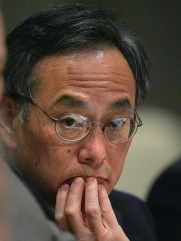|
|
|
|
|
|
|
News & Views item - July 2009 |
![]() The President Proposes and Congress Disposes. (July 14, 2009)
The President Proposes and Congress Disposes. (July 14, 2009)
 A thoughtful Steven Chu |
It is in fact a couple of proposals which the US Secretary for Energy, Nobel Laureate Steven Chu, has proposed and for which the requested funding has been severely cut by Congressional committees.
First off, in a speech to the National Academy of Sciences on April 27, 2009 US President Barack Obama announced RE-ENERGYSE (REgaining our ENERGY Science and Engineering Edge) which is "to inspire tens of thousands of American students to pursue careers in ... clean energy." He then followed up with a US$115 million down payment request as part of the Department of Energy's (DOE's) 2010 budget which the administration sent to Congress.
Steven Chu's proposal is to involve the broader academic community, not just the national laboratories such as Los Alamos, and would reach from elementary schools to postdoctoral research.
"We are investing a lot in green technology deployment," says energy Under Secretary Kristina Johnson, an engineer, entrepreneur, and former university provost who is to coordinate the initiative. "But I'm concerned that we are going to wake up one day and find that we don't have the people to get the job done. I saw that happen with the photonics industry, and we don't want to repeat that mistake." However, Dr Johnson acknowledges that DOE's senior managers, including science Under Secretary Steven Koonin, are still working out the details of the initiative, which will be managed by the Office of Energy Efficiency and Renewable Energy.
According to Science the Department of Energy's: "budget documents describe plans to divvy up US$80 million in 2010 among Ph.D. and postdoctoral fellowships, new master's programs in energy studies, and research opportunities for undergraduates. Most of the remaining US$35 million would go to seed technical training programs at community colleges, with an unspecified amount for outreach to elementary and secondary school students and teachers.
However, when it comes to science education there are significant demarcation disputes between federal agencies. The National Science Foundation has an education budget this year of nearly US$1 billion, while the Department of Education is the federal agency with explicit responsibility for science education. In addition NASA and the National Institutes of Health, also have significant education budgets within their own areas. Furthermore, in the past the US Congress has been disinclined to provide DOE a bigger role in STEM education, especially at the pre-university level.
At the end of June the House of Representatives energy and water appropriations subcommittee examined the DOE's budget request and admonished it saying it needs to do a better job of explaining how RE-ENERGYSE fits into existing programs at other federal agencies, recommended it be given US$7 rather than the US$115 million requested and told Dr Chu to come back next year "when he's worked out the details, in coordination with the White House Office of Science and Technology Policy". It's felt that Steven Chu isn't likely to accept this first rebuff quietly and Mike Lubell, head of the Washington, D.C., office of the American Physical Society, told Science he hopes Dr Chu succeeds. "Getting kids fired up about the opportunities and challenges in the field is terribly important. Improving STEM education in the United States is tough. But this is far more complex and will take a heck of a lot longer."
Then last week the appropriations committees in both the House of Representatives and the Senate made deep cuts in the DOE's request for eight new research "hubs" aimed at solving the US' energy problems. Dr Chu had requested US$280 million for the interdisciplinary centres in the 2010 fiscal year. The House committee approved $34 million, i.e. enough for one "hub" while the Senate committee gave "qualified" approval for several "hubs" but actual funding would cannibalise stimulus funds rather than the 2010 budget to pay for a specific construction project.
Dr Chu sees the hubs as miniature Bell Labs* in which top scientists from many different disciplines could work together to overcome specific energy-related challenges. Plans for most of them are now on hold at least for another year.
________________________________________________
*Steven Chu joined Bell Labs immediately after completing postdoctoral studies at UC Berkeley. At Bell Labs he and his several co-workers carried out his Nobel Prize-winning laser cooling work.